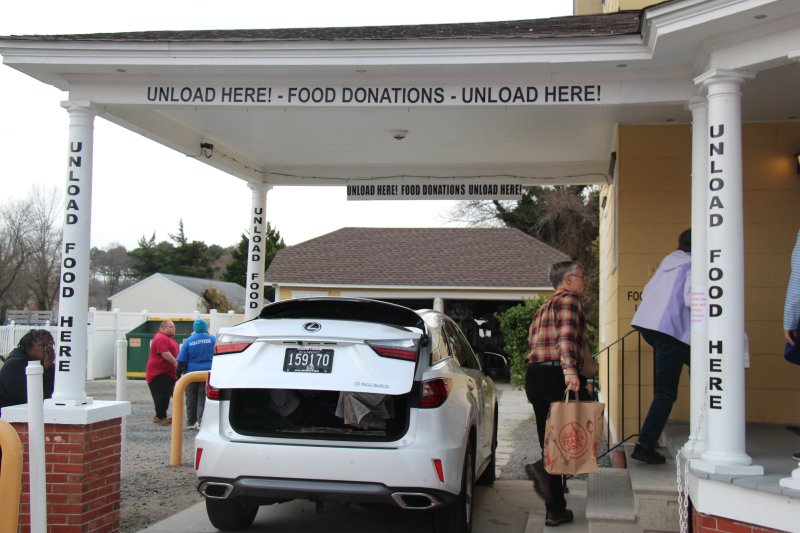The signs are becoming increasingly obvious. Long lines of people waiting for a free meal or clothing. People sleeping on public benches and the Little League dugouts. Trash piled along railroad tracks near an encampment.
Homelessness in and around Georgetown has increased sharply in the past two years, accompanied by complaints about panhandling, trash, substance abuse and other problems.
State lawmakers representing the community say they expect to unveil a plan around the end of the year to coordinate the state’s currently fragmented services to the homeless. It could eventually be replicated in other communities.
There are estimates of 250 homeless people in the Georgetown area, with many living in three encampments in the woods. Other encampments are scattered around Sussex County near communities such as Lewes and Rehoboth Beach.
Georgetown residents’ frustrations have boiled over at recent town council meetings and on social media.
“I don't think I should be pilloried for not wanting, as a taxpayer, to be approached at Wawa or to run into a junkie while I'm walking my dog,” said Robin Esham at a Nov. 10 Georgetown council meeting. “As a property owner, I don't think I'm a bad person for not wanting my property devalued.”
“I’m all for helping people, but I’m tired of getting kicked in the shins,” said Clayton Townsend at the meeting. “I can see what's happening to my town, and I'm very skeptical, I’ll just put it that way.”
Residents have also been raising concerns and complaints on the Make Georgetown Great Again page on Facebook.
Georgetown has passed ordinances in recent years in response to the growing homeless issue, said Mayor Bill West and Town Manager Gene Dvornick Jr.
A ban on camping on public property was enacted years ago. A pedestrian safety law allowing people to stand around a street corner for no more than two cycles of a traffic light was passed Oct. 28, 2024. An 11 p.m. to 7 a.m. ban on sleeping in the town’s historic Circle and parks was changed Oct. 17, to prohibit sleeping there between sunset and sunrise.
The town recently ordered signs that will be posted discouraging people from giving money to homeless individuals, West said.
A lot of the public’s ire has been directed at the work of the Shepherd’s Office and Springboard Delaware.
The Shepherd’s Office day program provides meals, clothing, supplies, support services and assistance with finding housing, said its director Jim Martin. It leaves food and clothing on tables on the porch outside its North Bedford Street office.
Springboard Delaware two years ago opened a cluster of 40 small housing units for the homeless off Douglas Street, called Pallet Village. It provides short-term housing, job readiness and counseling for substance abuse, and helps people find permanent homes.
Dozens of people filled the town council meeting room Nov. 10, several of them speaking against a proposed housing code amendment to allow cottage housing developments.
Some residents saw the draft rules as another move to expand homeless services. The houses are between 350 and 850 gross square feet with a common outdoor area.
Springboard Delaware is one of two groups with projects waiting for the law to pass so they can be submitted.
The other proposal, submitted by Little Living and the Fuller Center for Housing of Delaware, would create workforce housing. Springboard Delaware’s plan is for people looking to move from homelessness into permanent residences as they rebuild their lives and get jobs.
Following a report completed in April by the Delaware Affordable Housing Production Task Force, the state has been pressing municipalities to ensure their codes make it easier for affordable housing to be constructed.
The proposed town cottage housing rules were drafted in response to that directive, Dvornick said Nov. 25.
Rep. Valerie Jones Giltner, R-Georgetown, a retired critical care nurse, said at the Nov. 10 town council meeting that her professional training taught her to look for the cause of problems. But when she began looking into the growing homelessness issues, she found no single, simple cause.
“The nurse in me likes to diagnose and find out what the root cause is,” she added Nov. 19. “The rhetoric in Georgetown is being grouped into this one homeless problem. And they expect one cause and one way to fix it.”
Jones Giltner said she found there are many reasons why people become homeless. She said they face many risks, including sex trafficking and the cold of winter.
“It’s varied reasons why they are becoming unsheltered and homeless people,” Jones Giltner said.
The high cost of housing is the most significant cause of homelessness, said Judson Malone, executive director of Springboard Delaware.
And more and more homeless people have been congregating in Georgetown. Some blame it on the availability of free food and services.
Martin blamed sharply increasing costs of many things, including housing and auto repairs that leave many people one big bill from homelessness.
“We’re seeing the worst poverty we’ve ever seen,” said Martin, who has operated the Shepherd's Office for 14 years.
“For whatever reason, the people of Georgetown are really shouldering the burden,” Jones Giltner said. “[The homeless] have found great resources here, so they come here. But we are addressing it in a very fragmented way.”
Georgetown is the natural place for the homeless to congregate because it is the county seat, where the courts, medical facilities and other services are located, Malone said.
There are stories of homeless people encouraging others, some of them from out of state, to come to Georgetown because of the readily available services and access to food and housing, West and Jones Giltner each said.
Malone said a survey of homeless people found the vast majority have local roots, and they are generally not very mobile, traveling among local communities. Pallet Village primarily helps local homeless people, Malone said.
“Contrary to misconceptions, the program does not attract people from outside Georgetown,” he wrote in a recent letter to the editor. “Street outreach surveys confirm that nearly all [Pallet Village] residents have longstanding ties to Georgetown.”
West said he believes other homeless people are giving Pallet Village a bad name by panhandling, committing minor vandalism, abusing substances and littering.
Homeless people congregate at the Little League fields off East Market Street, and they ask people for money at street corners and shopping centers, residents said at the Nov. 10 council meeting.
“We have [apparently homeless] people knocking on car windows when people are waiting at drive-through windows,” Jones Giltner said. “People say they feel unsafe.”
The state’s Sussex Correctional Institution outside Georgetown contributes to the homeless problem, as people who are released remain in town for parole and probation meetings and court appearances, West said.
The community’s willingness to help the homeless has been stretched to its limit, some say.
“People can be very giving,” Jones Giltner said. “Georgetown is a community of givers. But when there is an issue of their safety, they don’t want to give anymore.”
While Georgetown has been at the epicenter of much of the debate over homelessness in Sussex County, it is much more than a local issue, said Sen. Brian Pettyjohn, R-Georgetown.
“Homeless is not just a Georgetown problem or a Lewes problem or a Seaford problem,” he said. “It’s a problem across the country.”
Editor’s note: This is the first part of a two-part series about homelessness in Sussex County. The second part will discuss ways to address and/or solve the issues.
Kevin Conlon came to the Cape Gazette with nearly 40 years of newspaper experience since graduating from St. Bonaventure University in New York with a bachelor's degree in mass communication. He reports on Sussex County government and other assignments as needed.
His career spans working as a reporter and editor at daily newspapers in upstate New York, including The Daily Gazette in Schenectady. He comes to the Cape Gazette from the Cortland Standard, where he was an editor for more than 25 years, and in recent years also contributed as a columnist and opinion page writer. He and his staff won regional and state writing awards.
Conlon was relocating to Lewes when he came across an advertisement for a reporter job at the Cape Gazette, and the decision to pursue it paid off. His new position gives him an opportunity to stay in a career that he loves, covering local news for an independently owned newspaper.
Conlon is the father of seven children and grandfather to two young boys. In his spare time, he trains for and competes in triathlons and other races. Now settling into the Cape Region, he is searching out hilly trails and roads with wide shoulders. He is a fan of St. Bonaventure sports, especially rugby and basketball, as well as following the Mets, Steelers and Celtics.























































